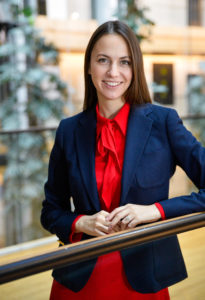My Internet: MEP Eva (Paunova) Maydell On Digital Growth, Classic Phones and Online News
My Internet is a series where DisCo discusses how movers and shakers use the internet for work, leisure and life in general.
Bulgaria’s Eva Maydell is one of the youngest and most visible members of the European Parliament. If the name’s a surprise, the woman behind it isn’t: MEP Paunova got married last month. A Brussels fixture on all things digital, she sits on the EP’s influential Committee on the Internal Market and Consumer Protection (IMCO) and is also the shadow rapporteur on the plan for digitising EU industry for the European People’s Party, which brings together the continent’s centre-right parties.
She’s also a regular on techy panels and a big social media user, who keeps her constituents informed through Facebook and Twitter. Working on areas from eCommerce to the app economy and the European Cloud Initiative, she’s enthusiastic about the power of the internet to transform society, but also wants to see citizens educated to use it wisely.
Born in 1986, she’s one of the few digital native MEPs. She started using the internet in high school, then became a regular user while studying at the American University of Rome, where she found it an “exciting tool” for research, but also learned about the importance of being discerning. “The first thing we were advised at uni was to be so aware of what sources we used, and to pay attention,” she recalls. “Today, that’s the biggest challenge — how do you actually get to the right information?”
In an era of misinformation, fake news and viral hoaxes, education in critical thinking and digital skills are vital. “The beauty of the internet is it’s out there for everyone to use — but how do you make sure that the information that is in certain outlets is verified information?” she asks. “As citizens we need to be very aware that not everything you read you should take for granted, you should be able to critically assess it, and in order to do that you need to possess the right skills, education wise.”
One upcoming dossier where this will be considered is the New Skills Agenda for Europe. Eva will also be the EPP Group’s rapporteur on FinTech. With the internet disrupting existing business models and creating whole new ones, “the influence of technology on the future of the financial sector will keep my team and me busy in the upcoming weeks and months,” she says. Completing Europe’s Digital Single Market by removing barriers to cross-border online trade within the 28-nation bloc is also a priority. Doing so “will open up new markets, increase competition and create additional economic growth so that we can secure Europe its place as the world’s digital leader.”
Ms. Maydell is definitely part of the young guard of tech-literate MEPs, and has embraced social media in all its forms. “Facebook I mainly use to communicate my work to the citizens back home,” she says. “I use it for accountability, I tell them about the meetings I’ve been at every day, adding short videos and press releases,” mainly in Bulgarian. It’s work that’s paid off: “Facebook uses our page as an example to show to other people of how one should manage their account!”
She’s also active on Twitter, but mainly in English. “It’s more about enlarging our network and being able to meet a new, broader audience.” Her next targets are Instagram and Snapchat, but she’s aware it takes time to do them properly — and that her LinkedIn account needs freshening up. She also takes advantage of the internet for internal communication. “I think the new email is actually chat, and in ten years… everything will be resolved over chat.” Her office operates using a number of group chats, which make it easier to discuss and decide things while travelling. The slow evolution from email to chat for serious work has reached the Parliament: tools like Slack have been transforming the way journalists work, while oil traders have long been loyal to Yahoo Messenger.
Other things coming up on her internet agenda: The EU plan for Digitising Industry, which covers a broad spectrum of policy measures, such as investing in public-private partnerships, a €500 million investment in a pan-EU network of digital innovation hubs and pilot projects around the Internet of Things. She’s also working on eCommerce, measures to encourage the app sector, and the Regulation for Cross-border Portability. “It is great for consumers who get access to their content while travelling, and at the same time gives companies the opportunity to provide more services for no cost,” she says. “We want to avoid having 28 different sets of rules for digital content sold online.”
When it comes to mobile connectivity, she’s surprisingly old-school. “You’ll laugh about it, but I’m still one of those Blackberry fans,” she says. “I really think it’s a work phone, not a play phone… for working on email and documents, it’s so easy for me to use.” She uses apps to read the Financial Times, Wall Street Journal, and Politico, to keep up with what’s happening in Brussels, and a “number of online media outlets” in Bulgaria. She also shops online “because I don’t have time to physically do it,” and uses the web to book flights, hotels and rental cars — with the transparency of pricing being one of the great features.
The transparency which makes online shopping so useful, and enables anyone, anywhere to share their views, is a double-edged sword and at the heart of discussions for EU policymakers in coming years. It’s a debate which fascinates Ms. Maydell. “One of the good things, is its transparency at its highest possible level that we can experience now,” she notes. “There are a lot of things that are also pure lies, and they’re also out there.” The good news is that extra transparency, combined with informed, educated internet users, can counteract lies, a key thing for this digitally savvy political leader.









